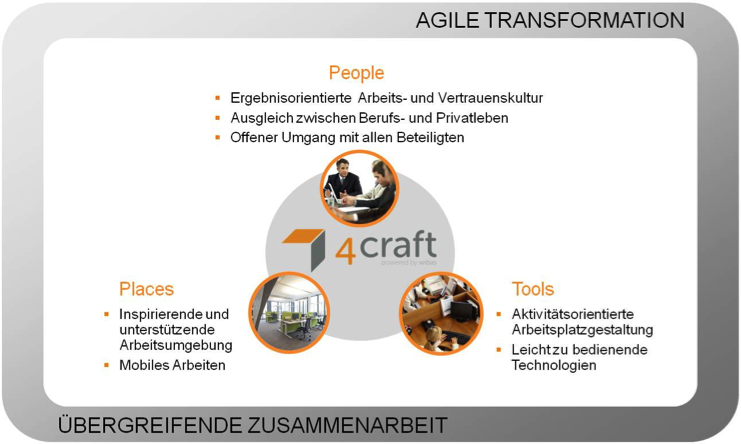SmartWorking - just another buzzword in the context of digitalization? Or rather a fundamental philosophy in the design of modern office environments? 4craft provides a clear answer to this question.
Working in the 21st century
Extensive studies confirm what is already noticeable in our everyday working lives in many places: work is becoming more flexible, more mobile and less strictly structured. Personal responsibility and trust are increasingly determining the framework of collaboration rather than place, time and control. The new forms of work are being implemented holistically through ICT-supported "mobile working" approaches, modern non-territorial workplace models (e.g. "desk sharing") and the redesign of innovative, inspiring office landscapes. All of this is flanked by a new management philosophy based on trust, appreciation and personal responsibility. Results-oriented management takes the place of management based on presence and control. In addition to these focal points of the fundamental change in working environments, entrepreneurs also have to deal with many other problems, the correct and individual answers to which will make a significant contribution to the overall success of the company.
Work processes are cost-efficient... BUT innovation and creativity are nipped in the bud.
The work environment perfectly supports repetitive standard tasks ... BUT employees have to solve complex problems (standard tasks are automated).
Work is well organized and structured ... BUT does not react flexibly to changes.
The company is global... BUT local silos prevent global collaboration.
SmartWorking is the answer to these problems. With the help of SmartWorking, we encourage and promote innovation and creativity. The working environment becomes a catalyst for the company's innovative capabilities - work barriers are eliminated, organizational functional silos are reduced through the use of the latest ICT technologies and agile working models. Reduced costs are a key factor to be taken into account and contribute to the company's success. The working environments are designed to be situation-oriented and thus enable more efficient use of the total space available. Structural and process costs are significantly reduced by up to a proven 35 percent! Space requirements, environment design and work processes follow market and customer requirements. The environment therefore adapts to changes with minimal effort in some cases and creates maximum flexibility in day-to-day business. In addition, SmartWorking offers sufficient freedom for employees to exploit their individual potential. And thus a high level of attractiveness in the not-to-be-neglected battle and successful retention of specialists and talent in the company.

Fig.1 SmartWorking in the triad of disciplines
Operationalization
In order for change to be successful, it is necessary for the board and management to actively drive change and become an integral part of the overall transformation. In other words, leading by example.
The changes in working culture also require close cooperation and a common understanding between all areas involved: Real Estate, ICT and Human Resources as well as the directly affected business units are inevitably called upon to pull together.
4craft uses a procedure for the implementation of SmartWorking that is applied equally in all projects. This scheme ensures the integration of the workforce and the consideration of their interests as specialists and people in everyday working life. People become the focus of all activities. The advantages of this are obvious. The 4craft approach ensures that the project becomes a project for the employees and people in the company - without neglecting the company's interests. As a result, discussions are less emotional and more technical. Acceptance of the change takes on a whole new direction: the company's employees are an integral part of the change and actively help to shape it in three key phases of a SmartWorking project.
- Analysis
In the analysis phase, the needs of the employees and organizations concerned are recorded using a process and space utilization study, among other things. This involves determining how employees and teams work together and which work categories they belong to. The information is collected through interviews with employees and managers as well as online surveys and inspections of the existing properties. Based on the results of the analysis, a tailor-made project setup is outlined andan official project launch is held with all those involved to inform them of all relevant facts.
- Concept
The findings of the analysis phase are used to derive the appropriate elements (e.g. room modules, training measures and ICT components) from the SmartWorking catalog and combine them into an overall target concept. A comparison with existing elements already in use reveals the actual remaining implementation requirements.
- Implementation
The necessary measures and resources are prioritized, planned and implemented. In principle, the completion of implementation is also associated with the movement of employees into the new concept.
Throughout all phases, the 4craft approach is based on an iterative procedure, so that the rapid realization of results, a high level of transparency and the early involvement of the employees concerned are guaranteed at all times.
Companies need people who enjoy working together.
We are convinced that we are not just talking about changing the workplace or the working environment. With Smart Working, we are initiating a continuous transformation process that means a holistic cultural change for companies. Our approach at SmartWorking therefore always starts with an individual analysis of the existing situation in order to define the best possible solution with all those involved in the second step. This means that the needs of employees and managers for the effective support of their respective activities are at the forefront of finding a solution, not just the redesign of office space or the provision of ICT solutions. We are convinced that companies need people who enjoy working together. To achieve this, it is not enough to change premises.

Write a comment